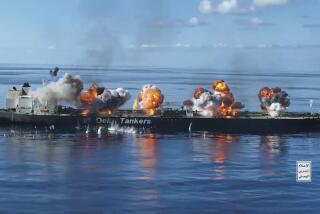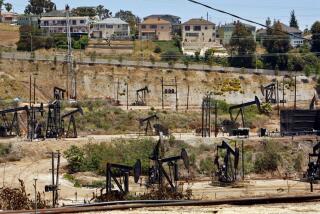Teams resume burning oil in Gulf of Mexico
- Share via
Reporting from the Gulf of Mexico — Wearing purple fireproof gloves, George Ross leaned over the side of a small boat and gingerly placed his igniter package — essentially a modified Molotov cocktail — into a syrupy pool of black oil that had bubbled up from the BP spill site a few miles away.
The fuse sputtered, then a marine flare spit flames between two half-gallon plastic jugs filled with diesel gel and lashed together with foam and tape. In seconds, a blaze roared up, black smoke poured skyward and the air sizzled with the sound of burning oil.
“Accch, she’s got the fire now,” said Ross, a grizzled Scotsman who works on oil spills around the world. “Listen to her snarling and spitting and crackling.”
It was the 13th burn of the day Saturday for the teams doing arguably the most dangerous and controversial work in the cleanup. In the three months since the Deepwater Horizon rig exploded and sank, killing 11 people, they have lit 329 fires at sea and burned more than 10.3 million gallons of oil.
No one has ever burned oil in U.S. waters after a spill, so government agencies, oil companies and environmental groups are watching closely.
“We’ve burned more oil than the Exxon Valdez spilled” off Alaska in 1989, said Ross, who helped clean up that disaster too. “No one can deny this is a success.”
Coast officials and oil spill experts describe the offshore burns as a crucial tool to destroy oil before it can reach shore. The burning is likely to increase now that BP has lifted a containment cap from the wellhead, allowing oil to gush without hindrance, with the goal of installing a tighter seal by Sunday. Officials say they may be able to permanently close the well by early August.
But confusion and delays still plague the oil-burn program, and may hinder its utility in the weeks ahead.
The burns resumed last Friday after a break that began June 21, when environmental groups filed a federal lawsuit charging that young sea turtles may have been burned alive between the fireproof booms used to corral the oil.
The reptiles, most of them endangered species, forage and hide in beds of sargassum seaweed, which float on the currents that aggregate the oil. No one could confirm that any turtles had been incinerated, but the issue led to a public outcry.
BP and the Coast Guard agreed to place wildlife biologists with long-handled nets aboard the igniter boats to grab any turtles before a burn. Then rough weather forced more delays.
Coast Guard Senior Chief Andrew Jaeger led the first boat back out last Monday to resume the oil infernos. But another storm moved in before the 30-boat burn fleet torched any oil, forcing it to return to port.
Jaeger said the oil must lie at least blanket-thick on the surface, and that only a super-hot igniter can set it ablaze. The thicker the oil, the more efficient the burn.
“It’s impossible to light with a match or fireworks,” he said. “Is it possible to light the oil by accident? No, it is not. This absolutely can be done safely.”
Fire-resistant boom has been rushed to Louisiana from Algeria, Brazil and elsewhere. “We’ve nearly depleted the world’s supply of fire boom,” Jaeger said. “We’re destroying them at a faster rate than they’re designed for in tests.”
Jaeger led the mission back to the burn zone Saturday, four hours by boat from the nearest port, Venice, La. When the continental shelf dropped away, the gulf appeared royal blue, but reddish streaks of oil sometimes stained the waves.
More than 50 miles from shore, ground zero for the BP spill, a frenzy of activity was visible in every direction.
Some 28 shrimp boats worked in pairs, towing both ends of 500 feet of fire-resistant boom to corral oil in U shapes, called burn boxes. The igniter boats, smaller aluminum-hulled craft and speedy red Zodiac inflatables, darted about to set the blazes.
Small spotter planes circled overhead to radio new sightings of oil patches. Dozens of skimmers and other cleanup or repair vessels, as well as oil rigs and tankers, dotted the horizon.
Wildlife observers hired from a Virginia company, East Coast Observers, rode in the igniter boats, closest to the burn boxes. No one had reported spotting any turtles since the fires resumed.
The morning saw a giant sludge burn that shot flames high in the sky and lasted more than two hours. A dozen smaller fires followed.
“We’re rewriting the book here,” said Donnie Wilson, president of Elastec/American Marine, which makes oil spill equipment, as he monitored the operation from a command ship. “We can take a few boats and boom, and burn more oil in a day than all the skimmer boats out here can collect.”
Wilson’s son recently visited and produced a short video of successful burns to the tune of “Ring of Fire,” the country classic by Johnny Cash. “It’s become our theme song,” Wilson said.
But the igniter crews struggled as an afternoon breeze kicked up foot-high waves. The surface oil became more emulsified, and thus frothy and difficult to light.
The fire lit by Ross, the Scotsman, fizzled out after a few minutes. He tried several times, but the pool of oil refused to catch fire. Even moving a 200-foot command boat to block the wind didn’t help.
“It’s been a rough day,” Dino Bertrando, the captain, said later. “This operation needs glassy water.”
Others were also frustrated. Two scientists from the Environmental Protection Agency rode to the burn site with plans to launch two helium balloons, each 15 feet in diameter, to take air samples directly from the smoke plumes.
A package of sensors attached to each balloon is designed to help determine if burning oil on salt water produces more hazardous byproducts than burning oil on land, as some scientists fear.
But after the EPA scientists left port, the project was postponed for at least two days amid confusion about the mission, whether it was safe, and who had approved it.
So far, air monitoring stations along the Gulf Coast have detected no toxic pollution blowing ashore.
Jaeger, a 20-year Coast Guard veteran, postponed deploying 10 more shrimp boats that were supposed to help with the burns. It wasn’t clear how many of the captains, all Vietnamese, speak English, he said.
“It’s already seen as a bit of a wild card, burning oil at sea,” Jaeger said. “We don’t want anyone to think we’re out here on a joyride. Because we’re not.”
More to Read
Sign up for Essential California
The most important California stories and recommendations in your inbox every morning.
You may occasionally receive promotional content from the Los Angeles Times.











